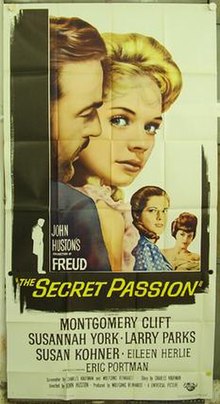Freud (film)
| Freud: The Secret Passion | |
|---|---|

Theatrical poster
|
|
| Directed by | John Huston |
| Produced by | Wolfgang Reinhardt |
| Written by | Charles Kaufman (story) Wolfgang Reinhardt |
| Starring |
Montgomery Clift Susannah York Susan Kohner |
| Narrated by | John Huston |
| Music by | Jerry Goldsmith |
| Cinematography | Douglas Slocombe |
| Edited by | Ralph Kemplen |
| Distributed by | Universal Pictures |
|
Release date
|
|
|
Running time
|
139 minutes |
| Country | United States |
| Language | English |
Freud: The Secret Passion, also known as Freud, is a 1962 American biographical film drama based on the life of the Austrian psychoanalyst Sigmund Freud, directed by John Huston and starring Montgomery Clift as Freud. The original script was written by Jean-Paul Sartre, but Sartre withdrew his involvement in the film after disagreements with Huston, and his name was removed from the credits. The film was entered into the 13th Berlin International Film Festival.
This pseudo-biographical movie depicts Sigmund Freud's life from 1885 to 1890. At this time, most of his colleagues refused to treat hysteric patients, believing their symptoms to be ploys for attention. Freud, however, learns to use hypnosis to uncover the reasons for the patients' neuroses through his mentor and friend Josef Breuer. His main patient in the film is a young woman who refused to drink water and is plagued by a recurrent nightmare.
The story compresses the years it took Freud (Montgomery Clift) to develop his psychoanalytic theories into what seems like a few months. Nearly every neurotic symptom imaginable manifests itself in one patient, Cecily Koertner (Susannah York). She is sexually repressed, hysterical, and fixated on her father. Freud works extensively with her, developing one hypothesis after another. Also shown is Freud's home life with his wife Martha (Susan Kohner), with whom he alternately discusses his theories, and patronizes when she reads one of his papers.
In 1958, John Huston decided to make a film about the life of the young Sigmund Freud, and asked Jean-Paul Sartre to write a summary of a projected scenario. Sartre submitted a synopsis of 95 pages, which was accepted, but later completed a finished script that, if filmed, would have amounted to a running time of five hours, and that Huston considered far too long. Huston suggested cuts, but Sartre submitted an even longer script of eight hours, justifying the even longer version by saying, "On peut faire un film de quatre heures s’il s’agit de Ben Hur, mais le public de Texas ne supporterait pas quatre heures de complexes" ("We can make a film of four hours in the case of Ben Hur, but the Texas public couldn't stand four hours of complexes."). Huston and Sartre quarrelled, and Sartre withdrew his name from the film's credits.
...
Wikipedia
